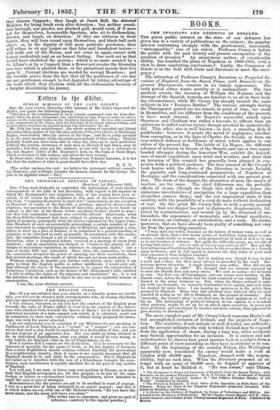THE ENGLISH PRESS.
Sts—If you are satisfied that your attacks on a friendly power are justifi- able, you will not be offended with correspondents who, by raising objections, give you opportunities of justifying yourself.
I will venture, therefore, to ask you how the conduct of the English press towards the ruler of France differs in kind from the conduct of the Ameri- cans who attacked Cuba towards the Queen of Spain ? for in both instances individual members of a state commit acts which, it is admitted, could not be committed by their state collectively, without being prepared for imme- diate war with the power attacked.
I do not understand you to complain of our Ministers for not speaking in Parliament of Louis Napoleon as a " tyrant" or " usurper"; you are con-
scious that such a step would be equivalent to a declaration of and you are not desirous of an aggressive war. But you insist on being war, to do, as individual Englishmen, en, what you admit it would be very wrong, or very foolish, for England—that is, for all Englishmen—to do. Now I confess that I cannot see the distinction. If it be necessary for the interests of morality, for the cause of truth, or for the dignity of freemen, that certain Englishmen should criticize without flinching the proceedings in a neighbouring country, then it seems to me equally necessary that all England should do it, and abide by the consequences. But if England bo not called on to interfere with the acts of a Frenchman towards his coun- hymen such interference is equally uncalled for on the part of any natives of England.
will not, I am sure, so lower your own position in Europe, as to con- tend that English newspapers are, for this purpose, to be put on the same footing as letters or conversations between Englishmen, never intended to reach the eyes or ears of strangers. Remonstrances like the present are apt to be ascribed to want of courage. I own to a great fear of being embarked in an unjust quarrel; and this it is which makes me cry, with one of Mr. Dickens's heroes, "Do you leave the Moon alone, and the moon will leave you alone." [The writer uses no signature, and gives no card of reference—contrary to the regular practice.]


























 Previous page
Previous page